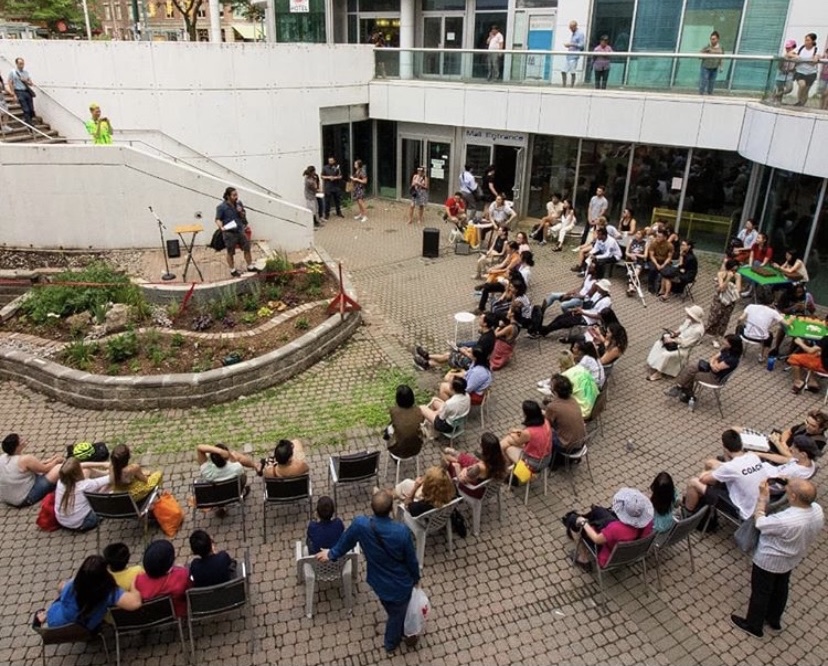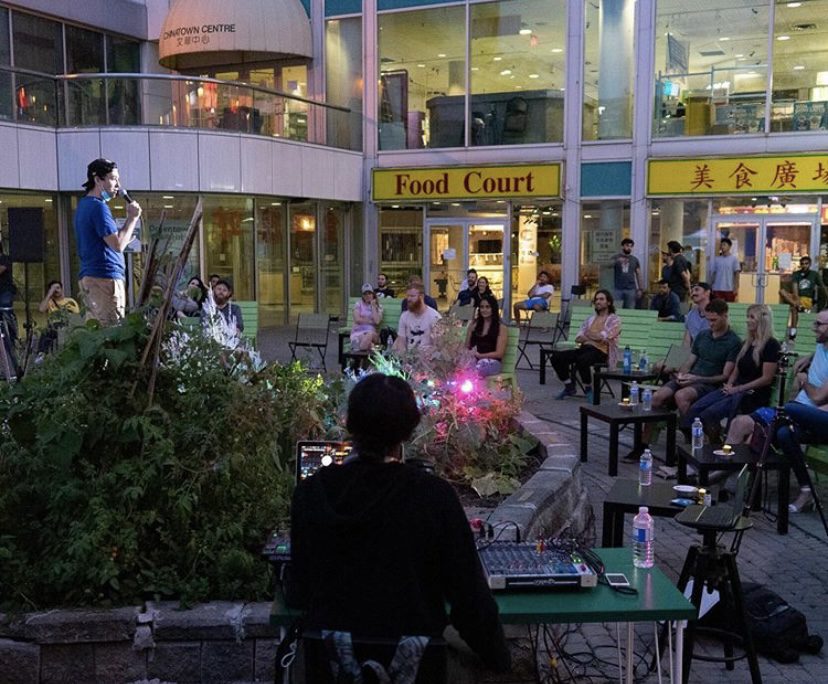Both organizations claim they use this space to ‘bring communities together,’ and neither are leaving

Tea Base, an art and activist-focused community space located in Chinatown, caught public attention recently after accusing 420 Cannabis Court of displacing its community members. Tea Base released a media statement on Aug. 31 expressing their concerns, but worry they are not being taken seriously.
420 Cannabis Court is a cannabis-friendly venue for comedians who have lost work opportunities due to COVID-19. It uses the Chinatown Anti-Displacement Garden for its events. 420 Cannabis Court followed up with a media release, claiming that it is not displacing members of the community, but rather providing entertainment and attracting more people to Chinatown Centre. On Sept. 22, they made 11 posts on their Instagram further explaining their side of the story.
The Anti-Displacement Garden was built by volunteers at Tea Base as a communal space for anyone to use freely. It was created to be a political statement and a resistance to displacement within Chinatown. Their concerns are that 420 Cannabis Court’s events will make this venue space more monetized and less accessible for the community.
“There are already so little public spaces in Toronto that people can exist in without purchasing something (or) paying a fee, especially within the context of Chinatown, a racialized neighbourhood that has a history of legislated racism,” Christie Carrière, a volunteer for Tea Base, says.
Carrière says that Chinatowns across North America are facing rapid and violent gentrification, and that developments continue to be made without any attempt to negotiate.
“People are being pushed out further and further, separated from their community and cultural ties, because they can no longer afford to live in the communities they’ve built and maintained,” she says.
Tea Base wants people to feel welcomed into their space and for it to be fully accessible to the local community.
Caryma Sa’d, co-founder of 420 Cannabis Court, doesn’t think it’s fair that Tea Base is accusing them of displacing their community members. While Tea Base uses the area as a community space, it is located in the Chinatown Centre courtyard, which belongs to the mall. 420 Cannabis Court makes a donation to the centre in order to use the courtyard and contributes to the upkeep of the area, according to Sa’d.
Sa’d says that comedians are not eligible for a lot of federal grants and decided these were a good group of people to help, adding that comedy is light-hearted fun that could help lift spirits during this time. When outdoor gatherings became possible again, she decided to bridge the needs of the comedians who lost work with the needs of those who have missed attending comedy shows during the pandemic.
“Right now, more than ever, outdoor spaces are important and we are trying to go about that in the most respectful way. Having it thrown back in our faces is just, you know, a little bit disheartening,” she says.

She says 420 Cannabis Court prioritizes marginalized voices when it comes to who performs at their shows. She says that good comedy comes out of people who have diverse experiences.
“We’ve had all types of people on our stage, and I really like it that way,” says Sa’d. “It’s kind of about bringing different communities together.”
420 Cannabis Court also claims to never turn anyone away from its events, except to avoid exceeding COVID-19 restrictions. Sa’d says that some of the local businesses are happy due to the increased traffic they are bringing to Chinatown Centre.
“We are hosting our comedy shows in a mall that is not heavily populated and close to abandonment. If that happens it could go bankrupt, and a bankruptcy means that it’s going to be razed and turned into actual condos which is actually gentrification,” Sa’d says. “We are trying to promote commerce and the local economy, and really keeping it grassroots because the little revenue that we do collect goes to pay staff performers and operating expenses.”
Tea Base volunteers, on the other hand, say it is misleading for 420 Cannabis Court to claim it is helping the surrounding area by bringing in more people, as the comedians and audience do not have vested interest in Chinatown itself and only come to the garden after mall hours. Although 420 Cannabis Court does not turn anyone away, Tea Base members question who they are most welcoming to and who their audience is made up of.
“We believe that they are not considering how their use of the space contributes to art-washing and invites the looming gentrification of Chinatown. Again, their audience consists of ‘Chinatown tourists’ with little investment in the Chinatown community,” says Carrière.
Tea Base volunteers claim that 420 Cannabis Court has been deleting any comments on social media that question the integrity of their programming, and are dismissive of their concerns.
“They have disregarded and silenced concerns and complaints from the local community and the Chinatown mall community, so we would ask whose community are they interested in strengthening and whose are they willing to sacrifice?” says Carrière.
For now, 420 Cannabis Court continues to use the Anti-Displacement Garden for events three nights a week. When the weather cools and they can no longer use the courtyard, they hope to begin indoor matinee shows.
